Drupal vs BigCommerce: Final verdict
Drupal vs BigCommerce presents a choice between a highly flexible open-source CMS and a comprehensive e-commerce platform.
-
Drupal (Overall Grade: 6.4/10)
is a powerful and versatile content management system ideal for developers and businesses needing extensive customization. It offers a wide range of modules and themes, making it suitable for various types of websites, from personal blogs to complex corporate sites. However, its steep learning curve and the need for technical expertise can be challenging for beginners. Drupal excels in flexibility, security, and AI capabilities, making it a strong choice for those who require a highly customizable and secure platform. -
BigCommerce (Overall Grade: 7.9/10)
stands out as a robust e-commerce platform designed to support businesses of all sizes. It offers a user-friendly interface, a wide range of built-in features, and extensive support resources, making it easier for merchants to create and manage their online stores. BigCommerce excels in ease of use, ecommerce capabilities, and customer support, making it an excellent choice for businesses looking to scale their online presence with minimal technical hassle.

|

|
|
|---|---|---|
|
Design functionalities & templates |
7.8 |
7.8 |
|
Ease of use |
5.4 |
7.3 |
|
Ecommerce |
7.5 |
9.0 |
|
Website Editors |
7.5 |
7.9 |
|
Product testing options |
7.1 |
7.3 |
|
Price |
5.7 |
7.4 |
|
Hosting quality |
0 |
7.8 |
|
Website speed optimization |
6.4 |
7.6 |
|
Plugins and integrations |
8.6 |
7.7 |
|
Marketing features |
8.0 |
7.9 |
|
Customer support |
6.7 |
8.7 |
|
Security |
8.3 |
8.9 |
|
AI capabilities |
7.5 |
7.3 |
|
User Management |
9.1 |
8.9 |
Which one is the best for ecommerce: Drupal or BigCommerce?
 7.5
7.5
 9.0
9.0
Verdict
: Drupal vs BigCommerce shows that while Drupal offers flexibility and extensive customization, BigCommerce excels with its comprehensive ecommerce features and ease of use.
-
Drupal
: Drupal is a powerful open-source CMS that can be tailored for ecommerce through its Drupal Commerce module. It offers extensive customization options, making it suitable for developers who need a flexible and extensible platform. However, it has a steep learning curve and may require significant customization to meet specific ecommerce needs. Best For Ecommerce score: 7.5 -
BigCommerce
: BigCommerce is designed specifically for ecommerce, providing a robust set of built-in features that cater to businesses of all sizes. It offers advanced SEO tools, various payment gateway integrations, and multi-channel selling capabilities, making it a popular choice for merchants looking to scale their online presence. Best For Ecommerce score: 9.0
Which one is the best for informational and business websites?
 7.5
7.5
 7.5
7.5
Verdict
: When it comes to Drupal vs BigCommerce for informational and business websites, both platforms score equally at 7.5, but they cater to different needs. Drupal is ideal for those who need a highly customizable and flexible CMS, while BigCommerce is better suited for users looking for a user-friendly platform with robust e-commerce capabilities.
-
Drupal
: Drupal is a powerful open-source CMS known for its flexibility and extensibility. It is suitable for a wide range of websites, from personal blogs to complex corporate sites. Drupal offers a vast array of modules and themes, allowing for extensive customization. However, its steep learning curve can be challenging for beginners, making it more suitable for users with technical expertise or those willing to invest time in learning the platform. -
BigCommerce
: BigCommerce is a comprehensive e-commerce platform that also excels in creating professional-looking informational websites. It offers a user-friendly interface, a variety of customizable templates, and built-in features that make it easy to manage and scale an online presence. BigCommerce is particularly advantageous for businesses that plan to integrate e-commerce functionalities into their informational websites, providing a seamless experience for both site management and online selling.
Drupal vs BigCommerce: Detailed comparison
Design functionalities & templates
Design FunctionalitiesRepresents how well each platform allows for creative design and customization of websites.Score Components:
- Template Variety (30%): Range and quality of design templates.
- Customization (30%): Flexibility and options for design alterations.
- User Interface (20%): Ease and intuitiveness of the design process.
- Responsiveness (10%): Adaptability to different devices and screen sizes.
- Innovation (10%): Unique design features and tools.
 7.8
7.8
 7.8
7.8
Winner: Tie.
Both Drupal and BigCommerce offer robust design functionalities and a variety of templates, catering to different user needs and preferences.
Drupal, as a highly flexible and powerful content management system, offers a vast array of templates and designs to cater to virtually any website need. With thousands of themes available, users can choose from minimalist designs, industry-specific layouts, and highly customizable multipurpose themes.
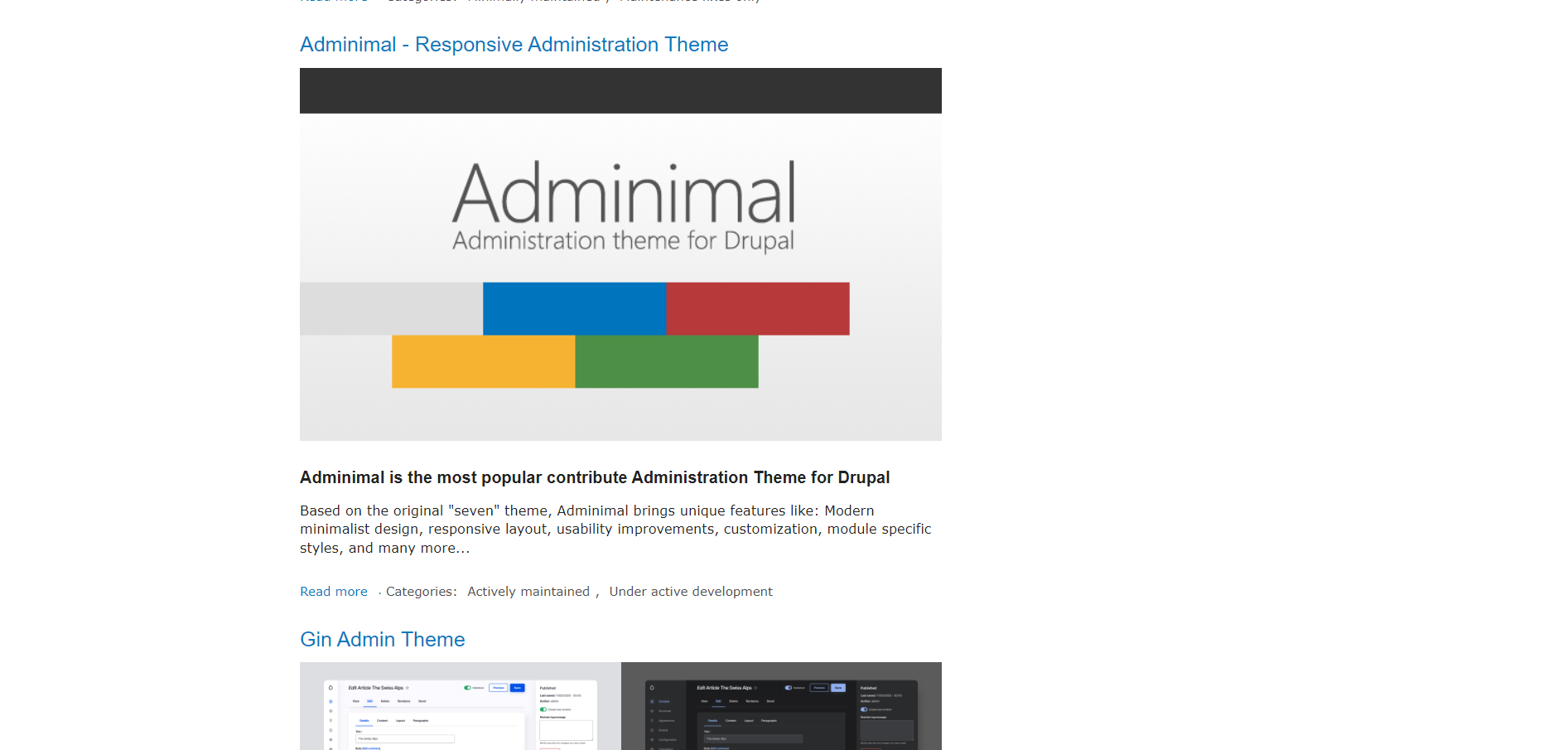

On the other hand, BigCommerce offers a variety of design templates for creating ecommerce websites, with a total of 240 themes available. Most of these themes come with up to four styling options, providing users with flexibility in design choices to match their brand’s aesthetic.
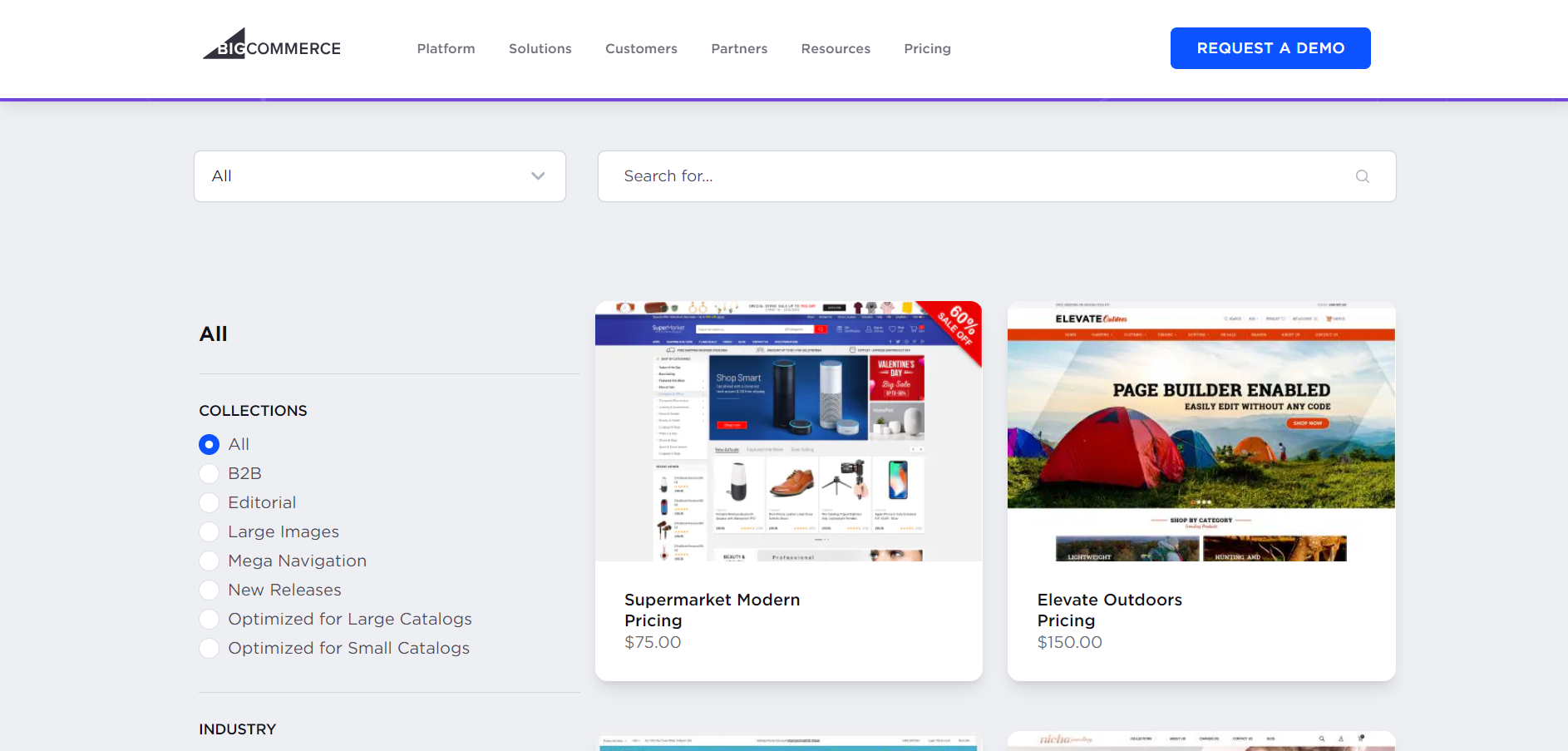
Get a head start on website creation with AI
Create a custom website tailored to your business needs 10X faster with 10Web AI Website Builder!
Ease of use
Ease of useReflects the platform’s overall user-friendliness.Score
Components:
- Learning curve (40%): Quickness and ease of getting started.
- Interface design (30%): Simplicity and intuitiveness of layout.
- User guidance (20%): Quality of tutorials and support.
- Flexibility (10%): Adaptability to various user skills.
 5.4
5.4
 7.3
7.3
🏆 Winner: BigCommerce
. Scoring 7.3, BigCommerce offers a user-friendly interface and a comprehensive set of built-in features, making it suitable for a broad spectrum of e-commerce businesses. Drupal, with a score of 5.4, is a powerful platform for building complex websites and applications, but its steep learning curve can be challenging for beginners.
Learning Resources
Both Drupal and BigCommerce offer a wealth of learning resources. Drupal provides extensive official documentation, a vibrant community forum, and a variety of online courses and tutorials. BigCommerce offers a wide range of resources designed to support e-commerce businesses at various stages of growth, including articles, guides, webinars, podcasts, and reports, along with specific training through BigCommerce University.
For ecommerce
EcommerceMeasures the platform’s effectiveness in supporting online business activities.Score Components:
- Ecommerce themes and templates (20%): Variety and design of templates.
- Product management (25%): Ease of managing and organizing products.
- Payment options (25%): Variety and convenience of payment methods.
- Ecommerce features (20%): Features for managing an ecommerce store.
- Integration (10%): Compatibility with external e-commerce tools and services.
 7.5
7.5
 9.0
9.0
When it comes to ecommerce, BigCommerce is a more comprehensive platform compared to Drupal. BigCommerce is designed specifically for ecommerce, offering a wide array of features including extensive POS integrations, a variety of shipping options, and a selection of over 100 mobile-responsive themes for design customization. On the other hand, Drupal, with its module Drupal Commerce, offers a flexible ecommerce solution that can be integrated seamlessly into its content management system. However, it has a steep learning curve and may require extensive customization to meet specific ecommerce needs.

|

|
|
|---|---|---|
|
Ecommerce themes and templates |
7.8 |
8.0 |
|
Product page customization |
8.3 |
8.3 |
|
Payment processing and commissions |
7.5 |
9.2 |
|
POS capabilities |
5.5 |
8.5 |
|
Payment gateways |
7.7 |
9.0 |
|
Product numbers |
7.0 |
9.5 |
|
Additional ecommerce features |
8.0 |
8.4 |
Drupal ecommerce features:
- Shopping Cart and Checkout Process
- Payment Gateway Integration
- Order Management and Invoicing
- Tax Calculation and VAT Support
- Shipping and Fulfillment
- Promotions and Discounts
- Reporting and Analytics
- Security and Compliance
BigCommerce ecommerce features:
- Unlimited Products
- Streamlined Single-Page Checkout
- Order Management
- Abandoned Cart Recovery
- Marketing and Sales Tools
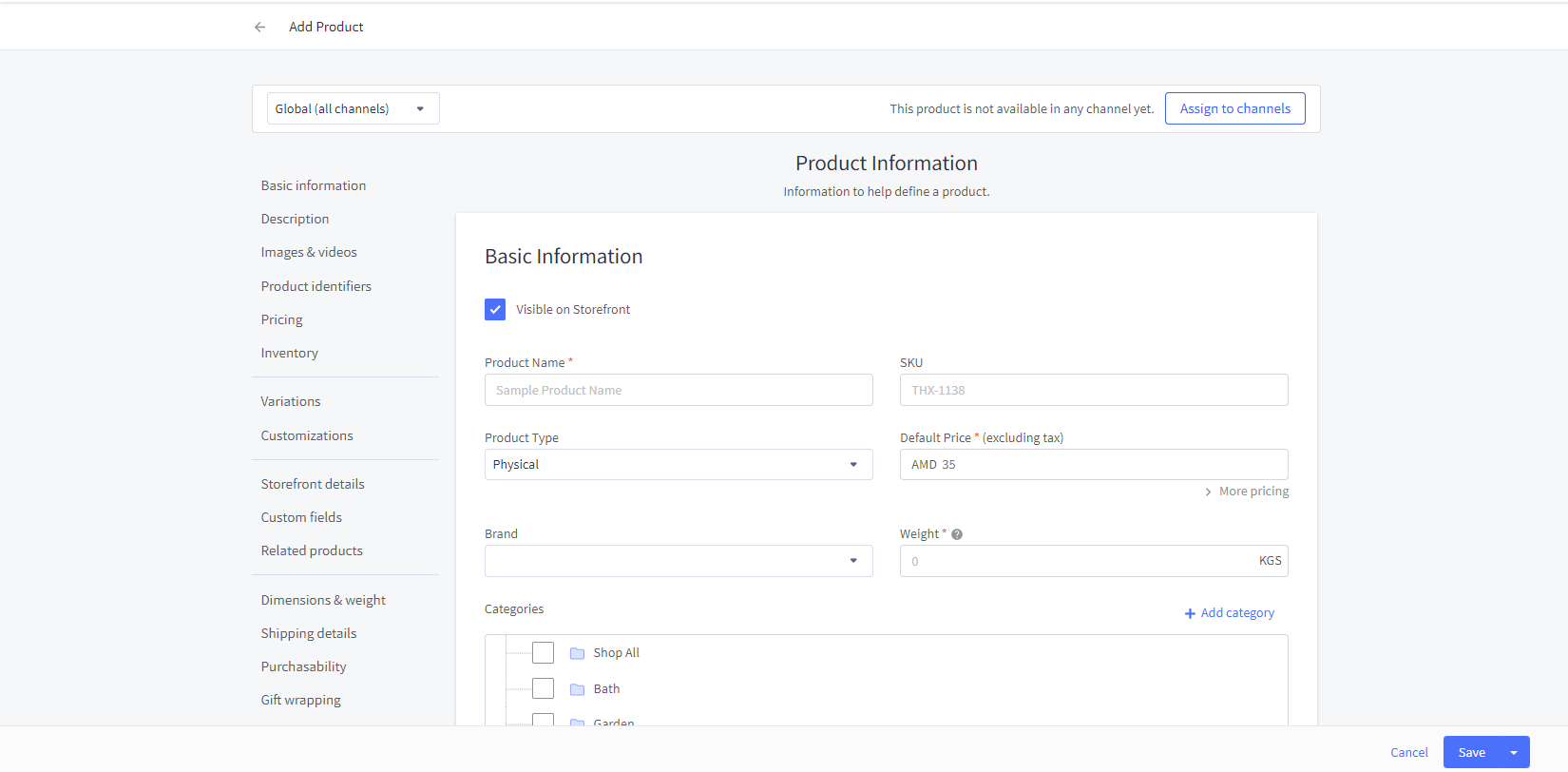
Ecommerce themes & templates
Drupal offers a wide array of eCommerce themes designed to cater to different types of online stores, from clean and simple designs to more sophisticated and feature-rich options. These themes are built with responsiveness in mind, ensuring that stores function seamlessly across various devices. On the other hand, BigCommerce provides a wide variety of eCommerce templates designed to enhance online shopping experiences and cater to different industries. These templates feature advanced functionalities like quick view, product suggestions, and complex search filters but may require performance optimization for maintaining speed.
Product page customization
Drupal offers extensive customization possibilities for product pages through its modular architecture, allowing for detailed content types, flexible displays with Views, and theme customizations. The Drupal Commerce module enriches e-commerce functionalities, enabling tailored product management, checkout flows, and payment systems. In contrast, BigCommerce allows for extensive customization of product pages, including the ability to create detailed product variants, customize options like custom fields, and upload multiple images or videos for each product.
Payment processing
Drupal supports a wide range of payment gateways through third-party modules, including popular ones like PayPal, Stripe, and Authorize.Net. While Drupal itself does not charge any commissions or transaction fees, the individual payment gateways integrated with it do have their own fee structures. On the other hand, BigCommerce supports over 65 pre-integrated online payment solutions, serving customers across 230 countries with more than 140 currencies, without charging additional transaction fees for using third-party payment gateways. This approach provides merchants with the flexibility to choose the best payment solution for their business needs.
Website Editors
Website EditorsEvaluates the platforms’ website building and editing capabilities.Score Components:
- Customization tools (40%): Range and power of editing features.
- Editor usability (30%): User experience within the editor.
- Design flexibility (20%): Freedom in layout and design changes.
- Update and maintenance ease (10%): Simplicity of updating and maintaining the site.
 7.5
7.5
 7.9
7.9
🏆
Winner: BigCommerce
. BigCommerce, with a score of 7.9, offers an extensive set of tools designed for creating professional and engaging online stores without requiring coding knowledge. It provides a user-friendly drag-and-drop interface, robust eCommerce capabilities including product management and secure payment processing, and customizable templates to match brand aesthetics. The platform also features powerful SEO and marketing tools, app integrations for extended functionality, and comprehensive analytics to track website performance.
Drupal’s editor, scoring 7.5, offers a wide range of features tailored for content creation and management. It supports rich text editing, enabling users to format text, insert links, images, and media, as well as create tables and lists with ease. The editor is highly customizable, allowing administrators to configure toolbars and options according to the needs of their site. Furthermore, it integrates seamlessly with Drupal’s content management system, supporting features like automatic content saving, version control, and access control, making it a powerful tool for building and managing diverse web content.
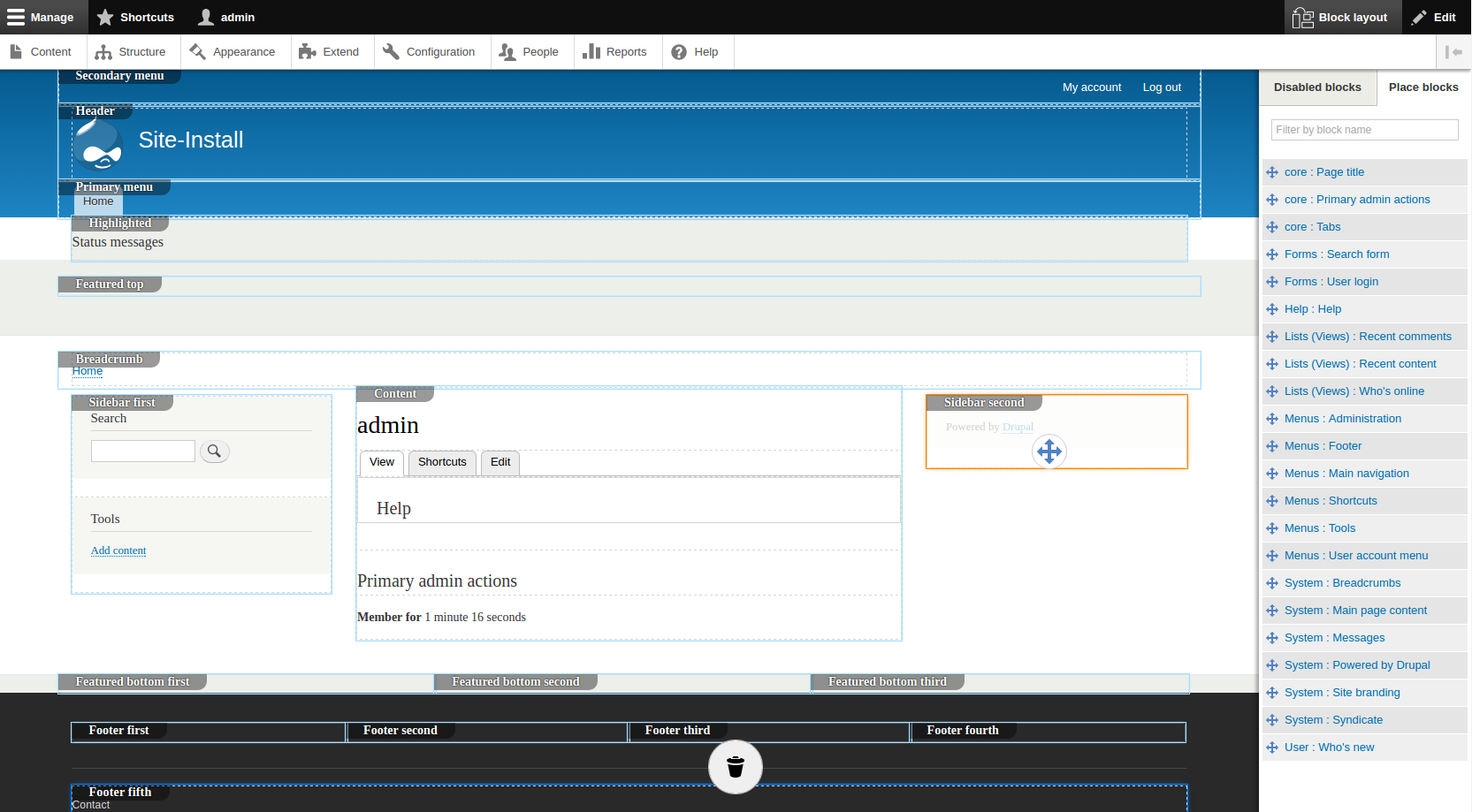
Mobile editor/app
 0
0
 7.5
7.5
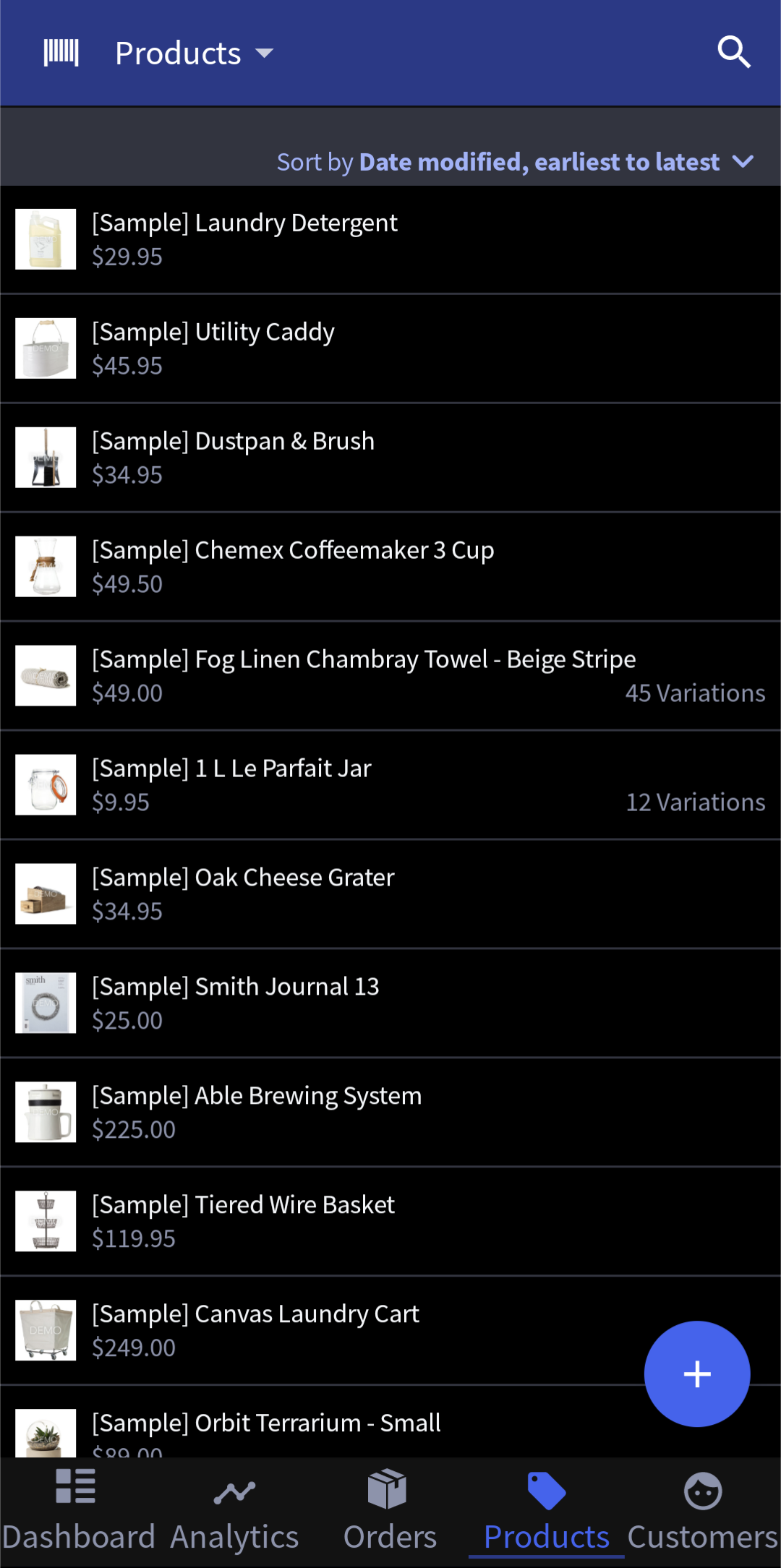
🏆
Winner: BigCommerce
. Both Drupal and BigCommerce have limitations when it comes to mobile editing. Drupal does not have a dedicated mobile editor app, which means you can’t edit your website on the go. On the other hand, BigCommerce does have a mobile app, but it doesn’t allow you to edit the website itself. Instead, it provides access to the dashboard, analytics, orders, and the possibility to add or edit products. This gives BigCommerce a slight advantage over Drupal in terms of mobile editor capabilities, even though it doesn’t allow full website editing.
Product testing options
Product Testing OptionsAssesses the options for trying out platform features before commitment.Score Components:
- Trial quality (40%): Extent and usefulness of the trial or free version.
- Feature accessibility (30%): How many features are available to test.
- Trial duration (20%): Length of the trial period.
- Ease of transition (10%): Smoothness of moving from trial to paid plans.
 7.1
7.1
 7.3
7.3
Overall Result
:
BigCommerce wins
. BigCommerce scores slightly higher than Drupal with a score of 7.3 compared to Drupal’s 7.1. BigCommerce offers a 14-day free trial during which users can test premium features. On the other hand, Drupal, being an open-source CMS, is free to use but does not offer a trial version or the possibility to test premium features.

|

|
|
|---|---|---|
|
Free Plan |
Yes (open-source software) |
No |
|
Trial Duration |
No |
14 days |
|
Testing Premium Features |
No |
Yes, during the free trial period |
|
Money Back Guarantee |
Not applicable | No |
Price
PriceLooks at the cost-effectiveness and value for money of each platform.Score Components:
- Plan value (40%): What each pricing tier offers.
- Transparency and clarity (30%): Clearness of pricing structures.
- Flexibility of plans (20%): Range of options to suit different budgets.
- Hidden costs (10%): Additional expenses not included in the plan.
 5.7
5.7
 7.4
7.4
While Drupal is free, it requires separate purchases for domain, web hosting, and website builder subscriptions. BigCommerce offers several pricing plans, including a custom-priced Enterprise plan for large-scale businesses.

|

|
|
|---|---|---|
|
$30-$40 |
No offering at this amount. |
Standard ($39.00/month): Unlimited products, file storage, and bandwidth, suitable for small businesses. Limited to $50k in online sales per year and up to 4 inventory locations. Value for price: 7.0 |
|
$100-$200 |
No offering at this amount. |
Plus ($105.00/month): Includes Standard features, plus customer segmentation and abandoned cart saver. Limited to $180k in online sales per year and up to 5 inventory locations. Value for price: 7.5 |
|
$300+ |
No offering at this amount. |
Pro ($399.00/month): All Plus features, plus Google customer reviews and advanced search filters. Limited to $400k in online sales per year, and up to 8 inventory locations. Additional $150/month for every $200k in online sales. Value for price: 8.0 |
location. As a result in rare cases the prices displayed here can differ from the ones you see on their
websites.
Hosting quality
Hosting
qualityExamines the reliability and performance of the hosting solutions.Score Components:
- Uptime (40%): Consistency and reliability of website availability.
- Speed (30%): Loading times and performance.
- Bandwidth and storage (20%): Sufficiency of resources provided.
- Data centers (10%): Quality and distribution of hosting infrastructure.
 0
0
 7.8
7.8
Winner: BigCommerce
. BigCommerce offers scalable cloud hosting with a 99.9% uptime and a 99.99% uptime guarantee. Drupal, being an open-source CMS, does not directly provide hosting services, and the uptime, uptime guarantee, and data centers depend on the chosen hosting provider.

|

|
|
|---|---|---|
|
Do they offer hosting? |
No | Yes |
|
Type of hosting: |
Depends on hosting provider | Cloud Hosting |
|
Uptime: |
Depends on hosting provider | 99.9% |
|
Uptime Guarantee: |
Depends on hosting provider | Yes, 99.99% |
|
Data Centers: |
Depends on hosting provider | Not disclosed |
Website Speed Optimization
Website Speed OptimizationEvaluates optimization of website loading timesScore Components:
- PageSpeed Score (30%): Google’s score indicating performance optimization.
- Loading Time (30%): The average time until a website is fully interactive.
- Mobile Optimization (15%): Optimization effectiveness for mobile devices.
- Resource Optimization (15%): Optimizing images, scripts, and other heavy resources.
- CDN Usage (10%): Use of CDN to enhance speed across geolocations.
 6.4
6.4
 7.6
7.6
🏆 Winner: BigCommerce
Both Drupal and BigCommerce offer various strategies for speed optimization, but BigCommerce has a higher Website Speed Optimization score.

|

|
|
|---|---|---|
|
Focus |
User-guided optimization |
Built-in optimization tools |
|
Performance Tools |
User-guided optimization |
Image Optimization, Code minification, AMP |
|
Key Strategies |
User-guided optimization |
Image Optimization, Code minification, AMP |
|
Load Times |
Varies depending on optimization |
Varies depending on optimization |
|
Page Speed Scores Range |
Varies depending on optimization |
Varies depending on optimization |
|
Core Web Vitals Improvement |
Depends on users |
Tools provided for CWV improvements |
Drupal, an open-source content management system, allows users to optimize almost all aspects of their website. However, the load times and PageSpeed scores vary depending on the level of optimization and website complexity. The Core Web Vitals improvements also depend on the users.
On the other hand, BigCommerce, a comprehensive e-commerce platform, provides users with built-in optimization tools such as image optimization, code minification, optimized templates, AMP, and caching. Like Drupal, the load times and PageSpeed scores vary depending on the level of optimization and website complexity. However, BigCommerce provides users with many tools for Core Web Vitals improvements of their websites.
Get a head start on website creation with AI
Create a custom website tailored to your business needs 10X faster with 10Web AI Website Builder!
Plugins and integrations
Plugins and integrationsMeasures the range and effectiveness of additional plugins and integrations.Score Components:
- Variety of options (40%): Range of available add-ons.
- Integration smoothness (30%): Ease of integrating plugins into the site.
- Quality of plugins (20%): Functionality and reliability of the options.
- Custom integration capabilities (10%): Support for custom or third-party integrations.
 8.6
8.6
 7.7
7.7
🏆 Winner: Drupal.
With a score of 8.6, Drupal leads the way with its extensive range of modules and seamless integrations. It’s a powerhouse for adding functionalities that scale with your business. BigCommerce, with a decent 7.7, offers a variety of plugins too, but Drupal’s breadth and depth, especially for complex websites, give it the upper hand.
It is however worth mentioning that there are more free modules available for Drupal compared to BigCommerce.
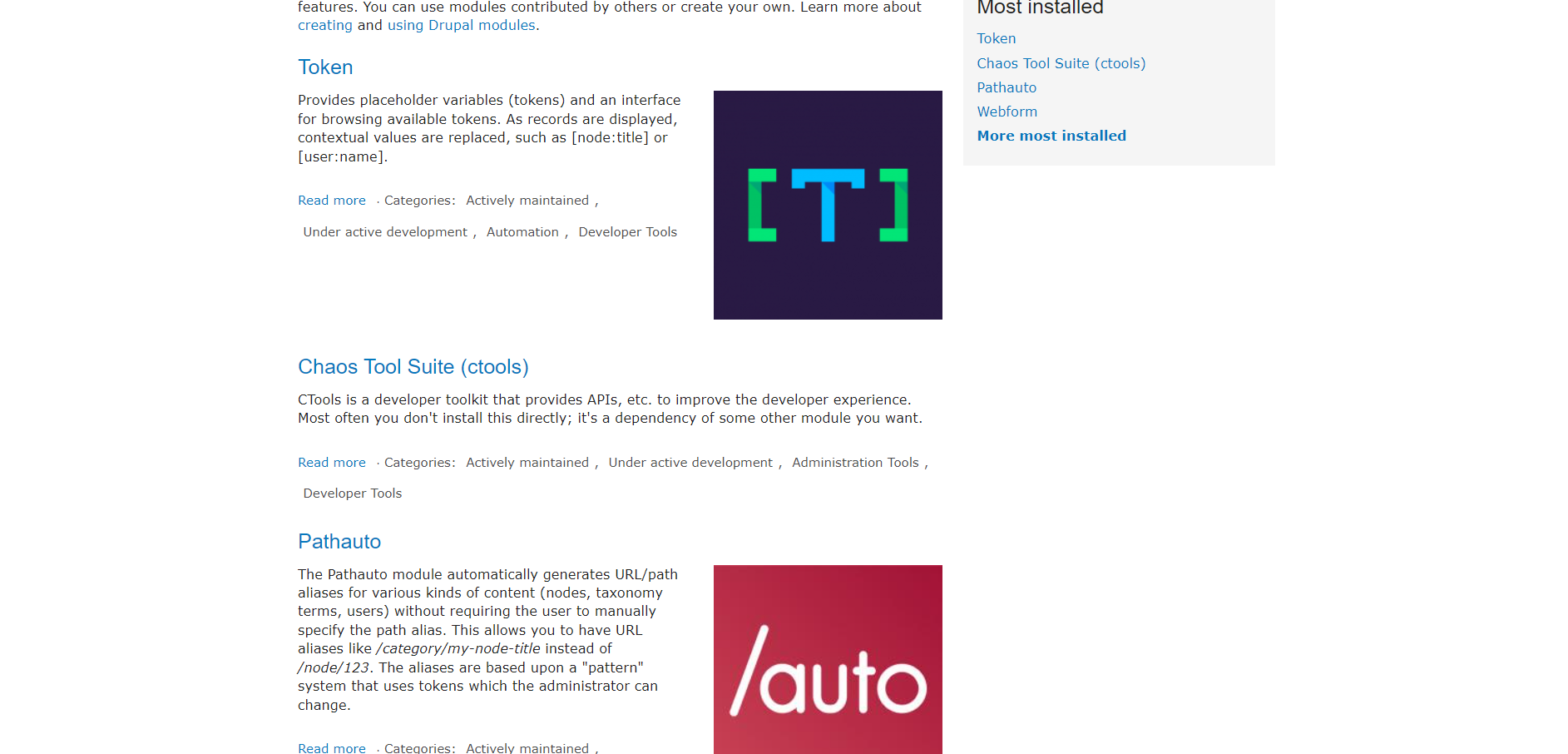
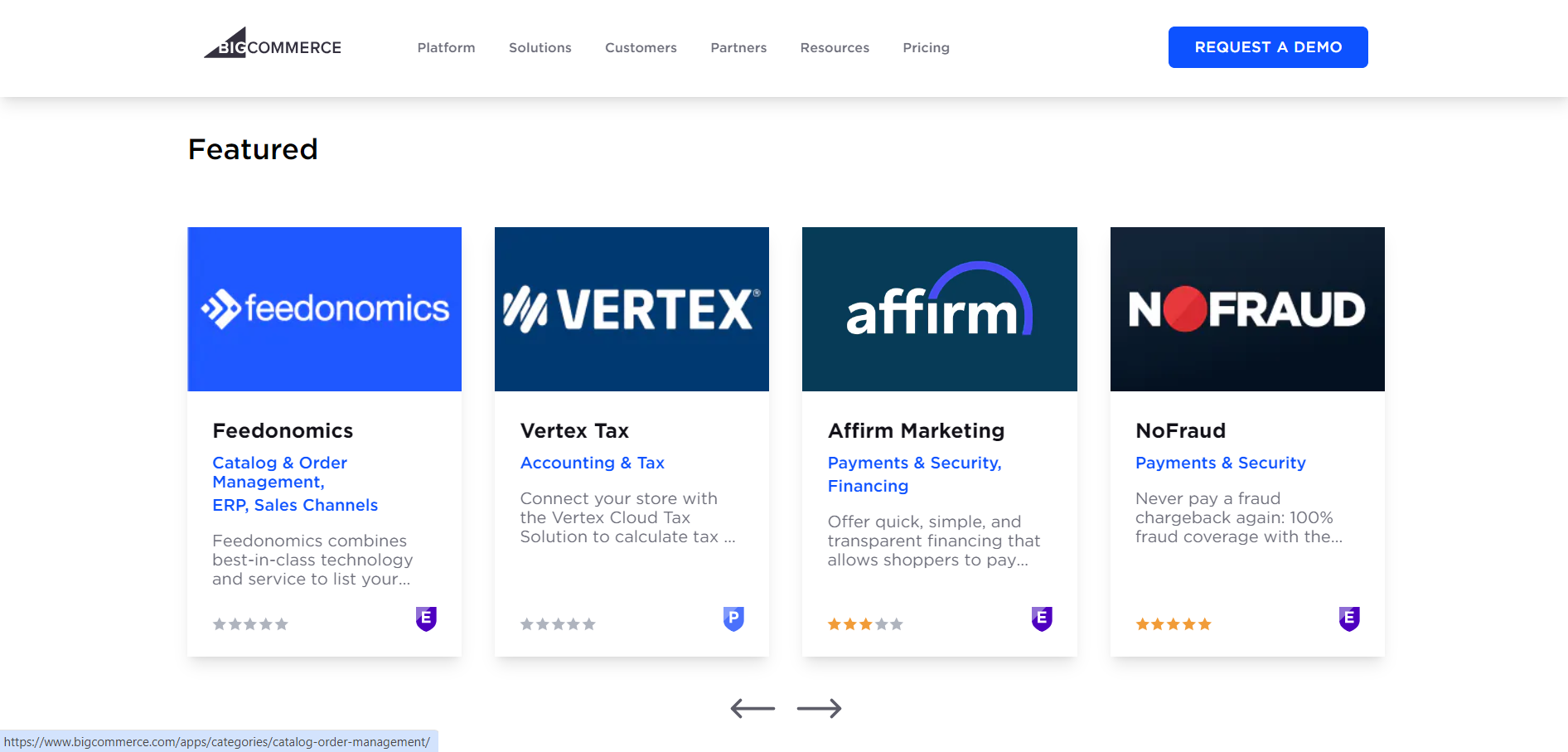
Marketing Features
Design FunctionalitiesRepresents how well each platform allows for creative design and customization of websites.Score Components:
- Template Variety (30%): Range and quality of design templates.
- Customization (30%): Flexibility and options for design alterations.
- User Interface (20%): Ease and intuitiveness of the design process.
- Responsiveness (10%): Adaptability to different devices and screen sizes.
- Innovation (10%): Unique design features and tools.
 8.0
8.0
 7.9
7.9
🏆
Overall Winner: Drupal
. Drupal stands out for its flexibility and extensibility, enabling developers to create complex websites with custom functionalities. BigCommerce is strong in its robust set of built-in features, including advanced SEO tools, various payment gateway integrations, and multi-channel selling capabilities across social media and marketplaces.

|

|
|
|---|---|---|
|
SEO Tools |
Yes, with SEO modules such as Yoast SEO |
Yes |
|
Email Marketing |
Yes, but with third-party extensions, such as MailChimp |
Yes, BigCommerce integrates with various email marketing services |
|
Blogging |
Yes |
Yes |
|
Social Media Integration |
Yes |
Yes |
|
Analytics and Reporting |
Yes, basic built-in features, and Google Analytics integrations through modules |
Yes |
|
Ads and Promotions |
Yes, but with third-party extensions |
Yes, through third-party integrations |
Customer Support
Customer supportEvaluates the quality and availability of support options.Score Components:
- Response time (40%): Speed of support responses.
- Support quality (30%): Effectiveness and helpfulness of the support.
- Availability (20%): Range of support channels (phone, chat, email).
- Resource richness (10%): Quality of self-help and educational materials.
 6.7
6.7
 8.7
8.7
🏆 Winner: BigCommerce
. In the Drupal vs BigCommerce comparison, BigCommerce takes the lead with a customer support score of 8.7, significantly higher than Drupal’s 6.7. BigCommerce offers 24/7 support through phone, email, and live chat, ensuring users can get help whenever they need it. The platform also provides dedicated phone lines for various regions and requires a support pin for personalized assistance, which enhances the support experience. Additionally, BigCommerce’s extensive knowledge base and active community forums are valuable resources for users seeking solutions and advice.
Drupal, on the other hand, offers a range of support options, including community support through forums and documentation on Drupal.org, and professional 24/7 support services via providers like Drupal Connect. While these options are comprehensive, they may not match the immediacy and accessibility of BigCommerce’s support channels. For enterprise-level support, BigCommerce excels with express routing, priority support, and customer success management, ensuring a smooth and efficient support experience for large businesses.
Security
SecurityLooks at the platforms’ security measures and data protection.Score Components:
- Data protection (40%): Safeguards for user and customer data.
- SSL and encryption (30%): Implementation of secure connections.
- Compliance (20%): Adherence to industry security standards.
- Regular updates (10%): Frequency of security updates and patches.
 8.3
8.3
 8.9
8.9
🏆
Winner: BigCommerce
. BigCommerce takes the lead in security with a score of 8.9, compared to Drupal’s 8.3. BigCommerce prioritizes data privacy and security by adhering to international regulations like GDPR and CCPA, employing data encryption, and hosting on secure data centers. The platform conducts regular security audits and continuous monitoring to preempt vulnerabilities. Additionally, BigCommerce empowers merchants with resources for best practices in security management.
Drupal, on the other hand, emphasizes website security through regular updates for both its core and contributed modules, alongside offering robust configuration options for enhanced protection. It includes built-in mechanisms for preventing common web vulnerabilities, such as data validation and sanitation to guard against SQL injection and XSS attacks. The platform supports advanced security features like two-factor authentication and provides extensive access control capabilities through user roles and permissions. However, it falls slightly short in comparison to BigCommerce’s comprehensive security measures.
AI Capabilities
AI capabilitiesMeasures the effectiveness of AI-driven features and tools.Score Components:
- Automation efficiency (40%): Impact of AI on streamlining processes.
- Personalization (30%): AI-driven customization for users or customers.
- AI-Assisted design (20%): Role of AI in website design and functionality.
- Data analysis (10%): Use of AI in interpreting user data and analytics.
 7.5
7.5
 7.3
7.3

|

|
|
|---|---|---|
|
AI Builder |
Drupal does not have an AI website builder |
BigCommerce does not have an AI website builder |
|
AI Ecommerce Features |
AI-enhanced chatbots, content creation, marketing automation, and cognitive services |
Personalized product recommendations, AI on-site search, and AI-powered chatbots |
|
AI Content Generation |
AI Connect module for content generation, SEO optimization, and multilingual support |
AI-powered writing tools for creating product descriptions and SEO metadata |
|
Additional AI Features |
AI-based search enhancements, content personalization, automated content moderation, language translation, content localization, and accessibility improvements |
AI-powered writing features for product descriptions, personalized storefronts, AI-driven data analytics, and the Maisie AI chatbot for sales, customer service, and marketing list growth |
🏆 Winner: Drupal
. Drupal’s AI capabilities, particularly its wide range of AI integrations, make it a more versatile choice for web development. It offers a broader scope of AI-enhanced features, including AI-based search enhancements, content personalization, automated content moderation, language translation, content localization, and accessibility improvements.
BigCommerce, with a score of 7.3, utilizes AI mainly to enhance the ecommerce experience. Its AI features focus on personalized product recommendations, AI on-site search, AI-powered chatbots, and AI-powered writing tools for creating product descriptions and SEO metadata. While BigCommerce’s AI is powerful, it is more business and ecommerce-centric compared to Drupal’s more versatile AI capabilities.
User Management
User ManagementAssesses the platforms’ capabilities in managing user roles, permissions, and accessibility.Score Components:
- Role Customization (40%): Flexibility in creating and defining user roles and
permissions. - Ease of Management (30%): User interface and tools for managing users.
- Access Control (20%): Effectiveness of access control measures for different user
levels. - Scalability (10%): Ability to manage a growing number of users efficiently.
 9.1
9.1
 8.9
8.9
🏆 Winner: Drupal
. Both Drupal and BigCommerce allow for an unlimited number of users, but they differ in their approach to user roles and permissions.
- Drupal’s flexible permission and role system allows for extensive collaboration and content management possibilities.
- BigCommerce offers a more structured set of roles with specific permissions.
Drupal User Roles and Access Levels:
| Role | Description | Access Highlights |
|---|---|---|
| Editor | Users responsible for content creation, editing, and publishing. | Can create, edit, delete, and publish content; can also manage comments. |
| Moderator | Users focused on site moderation, including comment and user management. | Can approve or delete comments, block users, and manage reported content. |
| Administrator | Users with full access to all administrative features of the site. | Can change site configuration, manage all content, users, permissions, and install modules/themes. |
BigCommerce User Roles and Access Levels:
| Role | Description | Access Highlights |
|---|---|---|
| Sales Staff | Enables all Sales Staff permissions | Manage, edit, and add orders – Finalize manual orders with manual payments – Manage returns, capture funds, and refund orders – Manage and edit customers – Manage and edit product reviews – Manage legacy coupons and promotions – Use Image Manager |
| Sales Manager | Enables all Sales Staff and Sales Manager permissions | Includes Sales Staff permissions – Manage, create, edit, and delete products – Manage product options and categories – Export orders – Manage customer store credit and export customers – Manage blogs, brands, and various reports (Ecommerce Analytics reports, abandoned cart reports, etc.) – Edit inventory and manage channels |
| Store Administrator | Enables all Sales Staff, Sales Manager, and System Admin permissions | Includes Sales Staff and Sales Manager permissions – Manage users and form fields – Manage settings (product filtering, store settings, checkout, inventory, order notifications, etc.) – Manage payments, shipping, and tax settings – Import catalog entities and customers – Access store design tools and Page Builder – Manage customer groups – Take store down for maintenance |
| Store Owner | Includes all permissions and is the person financially responsible for the account; this role has exclusive access to various account-related features. | Full access to all permissions and features across the platform – Exclusive access to account-related features and settings not available to other roles |
| Custom | Use this option to create your own combination of permissions. You can also opt to customize one of the other roles. | Customize permissions based on specific needs – Mix and match permissions from different roles to create a unique role with tailored access |
Additional Features

|

|
|
|---|---|---|
|
SSL Certificate |
|
|
|
Custom Domain |
|
|
|
Free Custom Domain Included |
|
|
|
International Domains |
|
|
|
Mobile Responsive |
|
|
|
Page Speed |
|
|
|
Website Builder Mobile App |
|
|
|
Convert a Website To An App |
|
|
|
Website Analytics |
|
|
|
Multilingual Sites |
|
|
|
Multiple Users |
|
|
Drupal vs BigCommerce: User Feedback
Users appreciate Drupal for its ease of use, security, and flexibility as an open-source CMS, highlighting its ability to scale and support a variety of websites and applications with modern technology tools. The community and documentation are frequently mentioned positives, providing ample support and resources. However, criticisms include a relative lack of plugins and themes compared to competitors like WordPress, the learning curve for customization without coding, and some challenges with installation and updates. The platform is praised for its robust content management capabilities, enabling users to manage content and user access efficiently. Overall, feedback underscores Drupal’s strength in creating secure, customizable, and scalable web solutions, despite some desires for more intuitive UI and easier setup.
User feedback on BigCommerce highlights a mix of experiences, with positive remarks on its ease of use, SEO configuration, and strong support team. However, significant criticisms include its lack of suitability for businesses with brick-and-mortar locations, due to issues with POS integration and sales tracking, as well as its inflexibility with customization and additional costs for necessary features. Additionally, concerns were raised about the platform’s steep learning curve for beginners, limitations in product variation and design options, and difficulties with order management. Despite these challenges, some users appreciate the platform’s ability to quickly launch and reliably host stores, alongside its potential for scalability and e-commerce growth.
The making of this blog
We followed a clear, step-by-step process to write and research this article.
Drupal vs BigCommerce: FAQ
Which platform is better for complex, customizable websites?
Can BigCommerce be used for non-ecommerce websites?
How do Drupal and BigCommerce compare in terms of user-friendliness?
Which platform offers better ecommerce capabilities?
In terms of security, which platform is more reliable?
Which platform is better for SEO?
Can I manage a multilingual site with either platform?
What kind of support can I expect from Drupal and BigCommerce?









